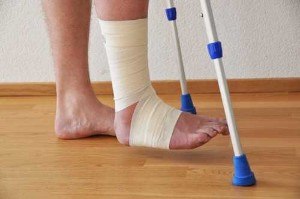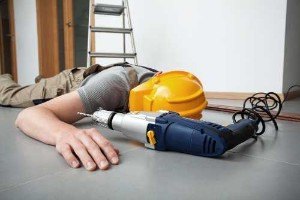Learn More About Workers’ Compensation Claims in Buffalo, NY
Getting sick or hurt is sufficiently unpleasant. Throw in the strain of filing a workers’ comp claim, a dash of income loss and a sprig or two of growing medical bills and voila…pandemonium! One of Ben Franklin’s pithier aphorisms compares the impermanence of suffering to the enduring benefits you reap hence… so long as you hire a good “buffalo ny workers compensation claims” lawyer.
Download Our Free Workers Compensation Guide
Fortuitously, there exist an elite handful of skilled and experienced lawyers who are committed to helping you. Their ilk challenges the Workers’ Compensation Board as they fight zealously for you. They strive to ease your way through recovery and back to a normalized life by obtaining the benefits you need to get back on your feet. These legal pundits from Cole, Sorrentino, Hurley, Hewner & Gambino, P.C. have compiled this eBook to educate you so you make the right choices following such an eventuality.
 Sustaining an injury is never a part of any job description. But workplace injuries happen. Most unfortunately, those who suffer injuries or develop chronic illnesses at the workplace stand to lose a considerable portion or all of their income. Additionally, their health and well-being suffers. Furthermore, depending on the extent and gravity of the injury or illness, the road to recovery can be long, hard and arduous.
Sustaining an injury is never a part of any job description. But workplace injuries happen. Most unfortunately, those who suffer injuries or develop chronic illnesses at the workplace stand to lose a considerable portion or all of their income. Additionally, their health and well-being suffers. Furthermore, depending on the extent and gravity of the injury or illness, the road to recovery can be long, hard and arduous.
Workplace injuries and illnesses are incredibly stressful, to say the least. Apart from the damage to your health and well-being, workplace injuries are in themselves tricky circumstances. We constantly encourage workers to consult with dedicated workers’ compensation lawyers in the event that they are injured or develop an illness at the workplace. This is because of the simple fact that it takes an experienced and knowledgeable expert to be able to maneuver the system effectively to receive what you deserve.
First Steps
There are a few things you need to do in the event that you sustain an injury or develop an illness at your place of employment. It is crucial that you follow these steps in this order.
- The first thing you must do is to get emergency medical attention, if and as necessary.
- Secondly – and only proceed to this step once you are medically fit to do so – you must report the injury or illness. This report must be in writing, and it must be submitted to the appropriate department or employer representative. Typically, these take the form of incident reports in several industries.
- Finally, you need to fill out the necessary paperwork and submit it to the Workers’ Compensation Board for review.
You may obtain your rightful benefits for all types of injuries, including, but not limited to:
- Neck and severely back injuries
- Knee, shoulder and joint injuries
- Eye and ear injuries
- Head injuries
- Burn injuries
- Amputations
- Fractures
- Repetitive injuries (carpal tunnel syndrome)
- Occupational illnesses and diseases caused by exposure to toxic chemicals and other hazardous substances
Schedulable and Non-Schedulable Injuries
 In order to understand what benefits you are eligible to receive, it is important to understand the two different kinds of injuries. Workers’ compensation contemplates two types of injuries – schedulable injuries and non-schedulable injuries.
In order to understand what benefits you are eligible to receive, it is important to understand the two different kinds of injuries. Workers’ compensation contemplates two types of injuries – schedulable injuries and non-schedulable injuries.
Schedulable injuries are typically those sustained on the arms, legs, hands, feet, fingers, toes, eyes and ears. When you reach your maximum level of recovery from a schedulable injury, that is, when such an injury improves as much as can be expected (a doctor’s opinion is required at this point), they are said to have reached maximum medical improvement and we obtain opinions for the scheduled loss of use for that part of the body which corresponds to a dollar amount reduced by the weekly benefits or wages already paid and the remainder is paid to the injured employee as a scheduled loss award.
Non-scheduled injuries are most often those occurring to the neck and the back. These also include head injuries, hernias, and certain diseases for which there are no scheduled loss awards. These are typically injuries from which a person suffers a permanent disability. Non-schedule benefits are based on the employee’s permanent loss of earning capacity.
General Overview of Workers’ Compensation in Buffalo NY
Whether you’re in Buffalo or anywhere else in the state, getting hurt at work can be extremely devastating. The loss of income, even for a short period of time, along with associated medical bills, can result in severe financial difficulties.
As your attorneys, we obtain professional opinions for the scheduled loss of use (see above) for the affected body part, which corresponds with a dollar amount which is reduced by the amount of benefits previously paid. You receive a lump sum scheduled loss award, and are still protected for treatment necessitated by your accident. This is ultimately what workers’ compensation is. It is important to note that workers’ compensation does not pay for pain and suffering, or punitive damages.
An individual with a workers’ compensation claim (also called a workman’s compensation or workers’ comp claim) should not rely on just any lawyer. He/she should be sure to retain an attorney who is familiar with both the substantive issues of workers’ compensation law and the procedural issues at the Workers’ Compensation Board.
Workers’ compensation insurance exists to prevent this from happening. Unfortunately, the workers’ compensation process does not always work as expected or isn’t enough to protect the employee fully. In these situations, an experienced legal team could give you the help you need. A general overview of workers’ compensation would be:
- it pays a percentage of wages as long the disability lasts;
- it covers all medical treatment related to the accident (including mileage to and from the doctor);
- it pays a specified amount for permanent injuries to certain body parts once you reach your best possible level of recovery. This is referred to as reaching maximum medical improvement.
Workers’ Compensation in Buffalo
 Only a handful of lawyers in Buffalo practice regularly at the New York State Workers’ Compensation Board. Your workers’ compensation injury demands full, fair, and just financial compensation for medical bills and lost wages.
Only a handful of lawyers in Buffalo practice regularly at the New York State Workers’ Compensation Board. Your workers’ compensation injury demands full, fair, and just financial compensation for medical bills and lost wages.
Workers’ compensation refers to insurance that pays for lost wages and medical bills of employees who are hurt or become sick because of their job. Practically all New York State employers are required to carry workers’ compensation insurance.
When an employee is injured, he or she can file a workers’ compensation claim. Assuming the case meets certain basic requirements, the employee will receive weekly cash benefits and payment of medical bills, regardless of who was at fault for the injury. This means an employee who was directly responsible for his or her own injury can still receive workers’ compensation benefits. However, in most cases the employee cannot sue his or her employer even if the employer may have been directly responsible for the injuries. There are, of course, a few exceptions to this limitation.
What Is Covered by Workers’ Compensation Insurance and What Is NOT Covered in Buffalo NY?
In order to recover workers’ compensation, you must have been accidentally injured while on the job, in your position as a working employee. Additionally, your injuries must be related to the job. For instance, if you’re a professional painter and hurt your back while painting a customer’s house, that’s probably covered. But you’re likely not covered if you were injured when a drunk driver ran off the road and hit you during a painting job.
Even if you meet the requirements, you could still be ineligible to receive workers’ compensation benefits. This is likely if you were under the influence of drugs or alcohol at the time of the injury, or if you were acting inappropriately while on the job. Engaging in horseplay, or knowingly and intentionally misusing equipment are both reason to have your workers’ compensation claim denied.
Types of Workers’ Compensation Benefits for Buffalo Area Residents
If you have been injured at your place of employment, the benefits you may expect to receive will depend upon the extent of the injury, and your ability therein to return to work. Retaining a good attorney at this point will prove to be incredibly beneficial because they will ensure that you receive the workers’ compensation benefits you deserve.
Types of workers’ comp benefits in Buffalo to which you may be entitled include:
– Vocational rehabilitation
– Medical expenses reimbursement
– Disability pay
– Travel expenses to and from doctor appointments
The type and amount of weekly workers compensation benefits you receive depends upon your injury and the extent to which it prevents you from working. If you are completely disabled, you will receive more than if you are partially disabled. And if you are able to work light duty, you may qualify for a small amount of benefits in addition to your salary.
For certain injuries, you may be entitled to a scheduled loss award when your injury has reached maximum medical improvement. These include injuries to the toes and feet, fingers and hands, legs, eyes, ears and arms. The scheduled loss award takes into consideration that you will never regain full use or functioning of these body parts.
Depending upon your case, you may be entitled to a settlement.
Calculating Workers’ Compensation Payments in Buffalo NY
Unfortunately, you are not entitled to receiving the entire amount of your usual paycheck when you make a workers’ compensation claim. In fact, the most you can receive each week is two-thirds (up to certain limits) of your weekly wage. Sadly, it is likely to be even less than that. This is because the Workers Compensation Board calculates your weekly compensation payments based on a percentage of your weekly wage and your level of disability.
To explain this point further, let us give you an example. If your earnings were $500 per week and the Board considered you to be 100% disabled, you will receive $333.33 every week. But if you were 50% disabled, you would only get $166.67 every week. Furthermore, if you return to work, but cannot work at full capacity, you’re eligible to receive reduced earning compensation.
An injured employee is eligible to obtain all required medical care related to the work injury or illness. Medical benefits can also include out-of-pocket expenses, such as travel costs to get medical care you need. However, there are some rules on payments for the medical care.
One of the biggest restrictions is that Workers Compensation Board has to authorize any health care provider an injured party wants to use, except in cases of emergency treatment. Additionally, the employee may have to obtain prescription drugs and receive medical tests from facilities and pharmacies of the workers’ compensation insurance company’s choosing.
Suing an Employer for Injuries in Buffalo NY
 Generally speaking, if you were injured on the job, you cannot sue your employer for compensation for those injuries. There are two major exceptions to this rule:
Generally speaking, if you were injured on the job, you cannot sue your employer for compensation for those injuries. There are two major exceptions to this rule:
- Your injuries were the result of your employer’s intentional or egregious conduct. You may, however, be able to sue your employer under a personal injury claim.
- Your employer doesn’t have workers’ compensation insurance. If this happens, you may still be able to recover from the New York State Uninsured Employers Fund.
Even if you can’t sue your employer, you may be able to sue the responsible party if:
- Your injuries were due to a defective or toxic product.
- Your injury was the fault of someone not connected in any way to your employer.
When a Workers’ Compensation Claim is Denied in Buffalo NY
Often times, employees find, much to their sorrow, that their workers’ compensation claim has been denied by the Workers’ Compensation Board. The consequences of such an eventuality are that you could end up receiving benefits far smaller and/or fewer benefits than you think you deserve.
If the Workers’ Compensation Board denies your claim, or your workers’ compensation benefits are much smaller than you think they should be, it is in your best interest to hire a dedicated. experienced and skilled workers’ comp lawyer. Hiring a workers’ compensation attorney will benefit you enormously in all probability. Because of your lawyer’s thorough understanding of the nuances and the intricacies achieved as a result of a workers’ compensation claim, they will identify certain critical steps you may have missed.
In the event of a denial, there is a process in place to enable you appeal your case. Firstly, you will need to file an appeal with the Workers Compensation Board. Next, you will attend a hearing where a judge will decide whether to overturn your denial or award you additional compensation. While you are not required to have an attorney present for this hearing and appeals process, hiring one to advise you will secure the best possible outcome from this process.
Occupational Diseases
 Most employees and workers complete the same duties and tasks each day they are on the job. Whether that is typing at a computer or working in a factory, their bodies complete the same movements millions of times. Over time, this repetitive motion can result in long-term damage to the body and the joints, also known as occupational disease.
Most employees and workers complete the same duties and tasks each day they are on the job. Whether that is typing at a computer or working in a factory, their bodies complete the same movements millions of times. Over time, this repetitive motion can result in long-term damage to the body and the joints, also known as occupational disease.
Any chronic ailment that develops as a result of occupational activity is considered an occupational disease, or an on-the-job illness.
Helping You Receive Workers’ Compensation Benefits for Your Occupational Disease
When it comes to occupational disease, workers’ compensation lawyers who represent you will help you understand your condition, as well as your options for recovering workers’ compensation benefits for these injuries — particularly if the injury prevents you from working.
Some of the most common forms of occupational disease include:
- Repetitive stress injuries — After years of repeating the same motion over and over, permanent damage can happen to joints. Factory workers and clerical workers are often diagnosed with carpal tunnel syndrome or other arthritic conditions due to the requirements of their jobs.
- Toxic exposure — Workers who are around chemicals and dangerous substances all day are at risk of toxic exposure and serious conditions that arise after years of inhaling or simply being in proximity to these materials.
- COPD, reactive airway dysfunction syndrome (RADS) or occupational asthma — Dust and other substances in the air can cause or contribute to respiratory issues that can dramatically affect the quality of life for the worker.
- Vision or hearing loss — Workers who must work with bright lights or loud sounds can over time experience diminished vision or hearing.
In some cases, rehabilitation can reverse the effects of the job. In others, however, the damage is permanent. Either way, the injury can interfere with the person’s ability to perform his or her current job or to find another job within his or her skill set. A skilled lawyer at this point will not only help you get the entirety of the benefits that you deserve, but they will also ensure that necessary actions are taken to secure your future.
Construction Accidents in Buffalo NY
 Construction sites are some of the most dangerous workplaces of any industry. While employers and contractors set strict rules and safety precautions, accidents can occur. Given the size and intensity of the machinery being used, these injuries can be devastating.
Construction sites are some of the most dangerous workplaces of any industry. While employers and contractors set strict rules and safety precautions, accidents can occur. Given the size and intensity of the machinery being used, these injuries can be devastating.
Workers’ compensation laws state that if the accident occurs on the job, the employee is to be paid for medical expenses through workers’ compensation benefits. This includes money for time lost on the job because of the injury.
Helping You Recover the Workers’ Compensation Benefits You Deserve Following a Construction Site Accident
We encourage construction workers in Buffalo to seek expert legal counsel so that they are paid the full amount of workers’ compensation. Following a construction accident, the repercussions of which are massive and grave, to say the least, every worker deserves to receive compensation that is rightfully and fairly owed to them. Your attorney will work with you in order to first understand the extent and severity of your injury. They will likely also obtain second opinions from your doctors and other medical professionals. Your attorney will use this information to build a claim and fight for the amount of money that you should be paid, based on the extent of your injuries and the time you spend away from your job.
Common construction site injuries in Buffalo include:
- Back injuries, including whiplash, herniated and slipped disks
- Neck and spine injuries
- Head and traumatic brain injuries
- Knee injuries
- Broken or amputated legs or arms
- Falls from heights
Third-Party Claims on Construction Sites in Buffalo NY
Workers’ compensation covers all injuries to all hard-working employees in Buffalo, regardless of whether the employer or employee was at fault. In some cases, however, a third party (neither the employer nor employee) was at fault or contributed to the accident. This could include outside contractors, vendors or simply another person at the scene of the accident.
When you suffer an injury in a work-related accident, you are entitled to receive workers’ compensation benefits for as long as you are unable to work. These may include disability and medical benefits, as well as travel reimbursement for expenses related to the injury.
Download Our Free Workers’ Comp Guide
What to Do if You Were Injured on the Job in Buffalo
 You were injured on the job — now what? Where do you turn? Whom can you talk to about your situation? When can you file for workers’ compensation?
You were injured on the job — now what? Where do you turn? Whom can you talk to about your situation? When can you file for workers’ compensation?
Many people who were injured on the job have similar questions regarding filing for workers’ compensation. Below is a list of steps to take if you recently suffered a job site injury.
- Inform your employer of the injury.
If you have been injured on the job, you should inform your employer within 30 days of the accident. This is one of the most important steps to take following an accident at work because it initiates the workers’ compensation
process. Although verbal notice is acceptable, a written notice documents the action and offers evidence if your accident is ever questioned.
- Seek medical treatment.
Seek medical treatment as soon as possible after the job site accident and inform your physician that this is a workers’ compensation case. Be certain to tell your physician that it is a work-related injury every time you seek treatment, and remind him or her to file a report with the Workers’ Compensation Board and insurance company. It is vitally important to document your injury and the extent to which it limits your ability to work.
Note: Some employers require that you be treated by a physician of their providing. Be aware of your company’s policy so as not to compromise your workers’ compensation benefits.
- Contact an attorney.
Contact a lawyer who can help ensure you receive the benefits to which you are entitled under New York’s workers’ compensation laws.
FAQs
What do I need to know about workers’ compensation?
Workers’ compensation is a form of insurance that provides wage replacement and medical benefits to employees who sustained injuries and/or developed chronic ailments in the course of their work. Filing a workers’ compensation means that an employee cannot sue their employer. Workers’ compensation
- pays a percentage of wages as long the disability lasts;
- covers all medical treatment related to the accident (including mileage to and from the doctor);
- pays a specified amount for permanent injuries to certain body parts once you reach your best possible level of recovery. This is referred to as reaching maximum medical improvement.
You should hire an experienced lawyer to guide you through the process. They will ensure that you do not miss any crucial steps that might hamper your chances at receiving the benefits you rightfully deserve.
What happens if I was injured at work?
If you get hurt at work, always report the injury to your employer as quickly as possible. Every workplace is different, but the best approach is to immediately give the employer written notice. Please note that this report must be in writing.
That notice satisfies only the notice requirement. It does not satisfy the claim filing requirement which requires that a C-3 form be filed with the workers’ compensation board. Proper filing of your claim is best handled by a workers’ compensation lawyer, who will complete that C-3 form and get it filed.
If you’re hurt at work, seek medical treatment. Tell the doctor you were injured at work. The doctor will file a report with the insurance carrier and the workers’ compensation board, which gets the case up and running.
Do I need a workers’ compensation attorney?
No. But it is highly advisable to get one.
Taking on the workers’ compensation system can be extremely difficult because so many issues pop up as your case progresses. You won’t know the answers to questions about the correct weekly benefit amount, based on your average weekly wage and degree of disability. Disputing your medical bills may occur as time goes on and you’ll need a knowledgeable advocate.
You need a dedicated Buffalo lawyer to navigate the workers’ compensation system because the workers’ compensation board is a neutral party that will not help you. Neither will the workers’ compensation carrier, the insurance company. They are there for the benefit of the insured company. Your employer is not likely to help you through the handling of your workers’ compensation claim. You need a representative who knows how to address your workers’ compensation claim to go to bat for you.
Can I sue my employer if I was injured at work?
A person who is injured at work cannot sue their employer; but may be able to sue a third party.
For example, if a truck driver who is driving their truck for work is struck and injured by another vehicle, they have a workers’ compensation case for their injuries as well as grounds for a potential lawsuit against the other driver and the other vehicle’s owner.
You cannot sue your employer for work-related injuries because that’s the purpose of workers’ compensation.
Which medical bills are paid by Workers’ Compensation?
Generally, the workers’ compensation carrier pays for all medical treatment related to injuries caused by a work-related accident or disease.
The workers’ compensation board works through medical treatment guidelines that set forth covered treatments in Buffalo.
If your doctor wants to prescribe treatment not addressed in those guidelines, he must apply for a variance to those guidelines using an MG-2 form which explains why the treatment is needed.
Do I need to attend my workers’ compensation hearing?
When clients ask whether they need to attend hearings, we tell them that we prefer that our clients attend their hearings to see for themselves what the judge is considering when it comes to their claim.
We also want them to observe the process first-hand.
If you’re working or simply cannot go to the hearing, we will take care of it; however, in most cases, we would rather have you at the hearing.
Can I lose my job and health insurance during a workers’ compensation claim?r
Many people think they are protected from loss of their jobs and health insurance because their injuries occurred at work, but that’s not the case.
Many people in Buffalo often lose their jobs because of being unable to work because of their workers’ compensation injury.
The Family Medical Leave Act maintains an injured employee’s health insurance for 12 weeks. If you are still out and disabled after that, you can lose your health insurance and your job.
The Family Medical Leave Act applies only to employers with more than 50 employees so, if you work for a small employer, you may find yourself losing your job much sooner than 12 weeks.
What is loss of wage earning capacity?
Caps is a term used in workers’ compensation for all neck, back, head injuries incurred after March of 2007. Typically, you will not continue to get weekly benefits for permanent injuries indefinitely.
Upon a finding of permanency, a loss of wage earning capacity is determined based on age, abilities, disability, type of work done, education, and training. A judge determines the percentage of loss of wage earning capacity.
Workers’ compensation law contains a chart that sets forth the remaining weeks for which you will receive benefits based on your percentage of loss of wage earning capacity. For injuries sustained before March 2007, we didn’t have to worry about caps or the number of weeks for which an injured person would receive benefits.
A caps makes it essential for an injured person to retain a lawyer to deal with the loss of wage earning capacity process for their workers’ compensation case.
What is a scheduled loss in a workers’ compensation claim?
Workers’ compensation contemplates two types of injuries – schedulable injuries and non-schedulable injuries. Schedulable injuries affect the toes, feet, legs, fingers, hands, arms, eyes and ears.
When schedulable injuries improve as much as can be expected, they are said to have reached maximum medical improvement and we obtain opinions for the scheduled loss of use for that part of the body which corresponds to a dollar amount reduced by the weekly benefits or wages already paid and the remainder is paid to the injured employee as a scheduled loss award.
Non-scheduled injuries are most often those occurring to the neck and the back – and there is no scheduled award for those injuries.
Non-scheduled injuries also include head injuries, hernias, and certain diseases for which there are no scheduled loss awards.
Can I apply for disability benefits if my claim was denied?
When a case is denied by the workers’ compensation carrier, we say that case has been controverted and no weekly workers’ compensation benefits will be paid.
We help our client apply for New York State disability benefits which enable an injured employee to receive New York State disability benefits while their workers’ compensation claim is being controverted.
If the claim is successful, the workers’ compensation carrier must reimburse the New York State disability benefits carrier. Meanwhile, these benefits help pay the bills while your case is being controverted and pushed through the workers’ compensation system.
Can I collect both social security disability benefits and workers’ compensation?
People in Buffalo can receive workers’ compensation benefits and Social Security concurrently; however, the two standards of disability are different.
People receiving workers’ compensation benefits are often denied Social Security disability, although some people do receive both.
In addition to the injury and disability caused by the work injury, the Social Security Administration considers any other type of condition you may have that causes you to be disabled. As people get older, other conditions may limit their ability to perform their jobs.
A formula based on what you were earning when you were working may reduce or offset your Social Security benefit as a result of your workers’ compensation benefits, but you still could receive both.
Can I collect unemployment benefits and workers’ compensation?
A person could receive workers’ compensation and unemployment at the same time, such as when a person is no longer totally disabled, is only partially disabled, but still cannot perform the duties of their regular job, and their employer refuses to take them back on light duty and with restrictions.
Although workers’ compensation benefits will be reduced to a partial rate, a worker can apply for unemployment as long as he has earned enough work credits during the period leading up to his application for unemployment.
Collecting unemployment and workers’ compensation at a partial rate, can help pay the bills.
What is vocal rehabilitation?
The workers’ compensation carrier does not offer paid rehabilitation.
People whose injuries preclude them from returning to the same work often ask whether the insurance company going to pay for re-training or education.
Although that answer is, no, a program called Access VR, accessible through workers’ compensation and New York State, helps people re-train and rehabilitate for a new career.
Injured people are enabled to obtain loans and grants to help pay for re-training or re-education.
Am I entitled to wage reimbursement if I no longer can do my job?
Workers’ compensation pays a percentage of an injured person’s wages, while some employers – often public employers – provide full wages for employees injured at work.
If you’re not working for one of those employers when you are injured – and are totally disabled from all work – you’re entitled to two-thirds of your average weekly wage.
When you’re no longer totally disabled, but still cannot perform your regular duties, you’re considered partially disabled and the carrier can reduce your benefits to a partial rate.
When workers’ compensation is reduced to a partial rate, I advise individuals to consider applying for unemployment because employees who are ready, willing, and able to work but cannot be accommodated by their employers may collect partial workers’ compensation along with unemployment.
What can you tell me about settling a workers’ compensation claim?
Settling a workers’ compensation claim is very serious because you’re signing away your right to any future benefits or medical care. It is important to can understand that settling should not be taken lightly.
Many people think they can put their medical treatment through on their own insurance but private health insurance policies contain an exclusion which precludes a health insurance carrier from paying for treatment for a work-related injury.
You cannot assume that Medicare will pay for any treatment related to your injury. We are obligated to take some of the settlement funds from your workers’ compensation case and put them into a Medicare set-aside account from which you pay for treatment related to your workers’ compensation claim.
Medicare set-aside accounts are used only for treatment that Medicare would otherwise cover themselves. Once we set up a valid Medicare set-aside, and after those funds are depleted, you can put your medical treatment through Medicare.
Never agree to a settlement without having your workers’ compensation lawyer involved because too many problems can occur. A Section 32 settlement, requires you to sign many documents that may be reviewed in a hearing before a judge tasked with making sure you know what you are doing – and risking – by signing off on your case.
What happens if my workers’ comp claim is denied?
If the Workers Compensation Board denies your claim, or your workers’ compensation benefits are much smaller than you think they should be, you should seriously consider hiring a workers’ compensation attorney. They understand the intricacies of a workers’ compensation claim and can help identify certain critical steps you may have missed.
In the event of a denial, you will need to file an appeal with the Workers Compensation Board. You will attend a hearing where a judge will decide whether to overturn your denial or award you additional compensation. While you are not required to have an attorney present for this hearing and appeals process, you should consider hiring one to advise you and secure the best possible outcome from this process.
How do I choose a workers’ compensation attorney?
Choosing the right attorney to represent you is crucial to the successful attainment of all the rights and benefits you deserve to be awarded. Do your research. If there are lawyers who offer free initial consultations, take advantage of this first meeting. Go and meet them; get to know them. It is important that you pick an attorney with whom you can communicate effectively and consistently, with whom you share a feeling of mutual trust and respect, who will spend time with you to understand your case, and who has considerable experience and a good reputation. Finally, you want to work with a workers’ comp attorney who will zealously protect your best interests and who will aggressively pursue any denied benefits.
The prospect of tackling the legal battle that you fear will ensue if you are injured at your workplace will only add to your growing anxiety. Please contact the experienced workers’ compensation attorneys at Cole, Sorrentino, Hurley, Hewner & Gambino, PC to help you get benefits you deserve on your road to recovery. Attorney Jerry Gambino and Jeffrey Moncher are experienced in helping residents who are facing a worker’s comp case.
Download Our Free Workers’ Comp Guide
